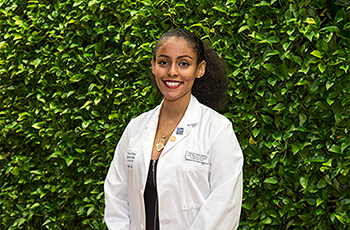Tirsit Makonnen, a second-year MD student at the George Washington University (GW) School of Medicine and Health Sciences, understands the power of giving back. Even before becoming a medical student, she made an impact on communities in the United States and abroad through internships and volunteer work. Then, in November 2017, Makonnen got the opportunity to help medical students in the mid-Atlantic region find their seat at the table as aspiring medical professionals.
As the GW chapter president for the Student National Medical Association (SNMA), Makonnen led planning and oversight of the Region 6 Medical Education Conference. Created in 1864, SNMA supports minority medical students and assists underserved communities.

Although Makonnen has now passed the baton of chapter president to a first-year medical student, she says it was an important experience. “SNMA provides minority students with the opportunity for professional growth, a medium to serve underserved populations, and the opportunity to promote our cultures in a positive light,” she says. “Helping host the conference was an honor and a privilege.” Makonnen took four years off before entering medical school to make sure becoming a clinician was her path. During that time, she volunteered in Baltimore, Ghana, and Ethiopia. “This desire to give back — I think it not only is something that will continue for me, but also will grow and branch out into different fields,” she says. During her eight months in Ethiopia, through an internship offered by the Joint Distribution Committee and the Foundation of Orthopedics and Complex Spine, Makonnen worked with orthopedic surgeons to help children with bad backs. The experience made her realize medicine was the right path for her. “I always wanted to be a doctor, but I wanted to be other things as well, and it was hard to make a decision,” says Makonnen, who was born in Ethiopia but moved to the United States when she was 4. “After my volunteer work, I realized this was what I wanted to do; it was a big turning point. Being in Ethiopia for an extended period of time and working with the children and really seeing the difference that I can make, I thought that was important.” Makonnen also has volunteered with the American Heart Association in Baltimore, teaching elementary school students in after-school programs about healthy heart habits. “The majority of the kids were African American, and I thought it was important that they saw someone who looked like them come and educate them,” she says. Now at GW, Makonnen says she is happy for the opportunity to study what she loves — and the comfort of understanding her own place at the table as a medical student. “Medicine is the intersection of working with people, helping people, and using science and evidence-based data,” she explains. “If medicine lacked any of those things, I don’t think I’d be here. But I’ve never learned so much … I can’t imagine not working in this field.”



